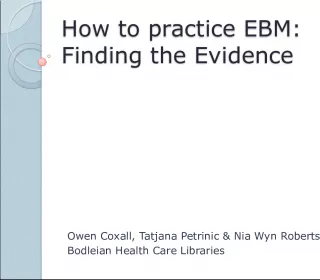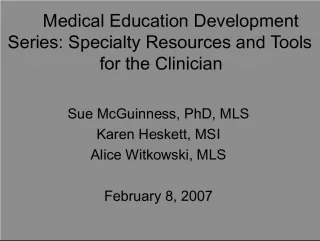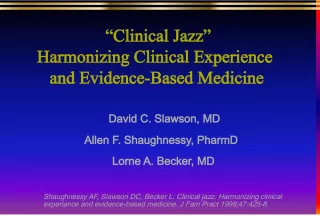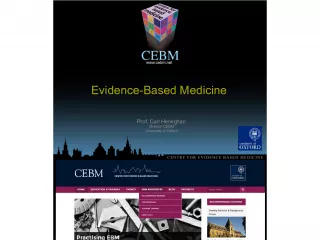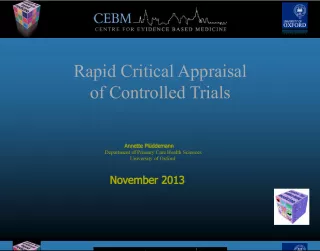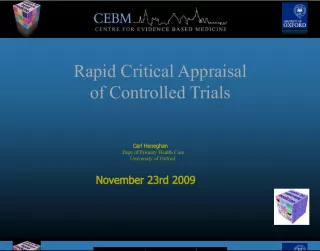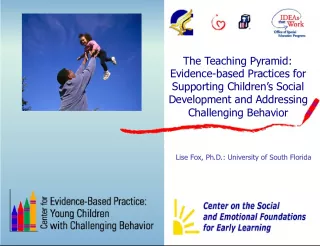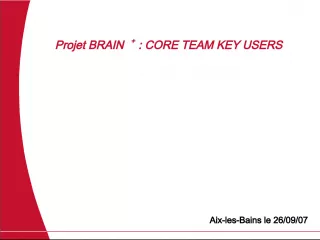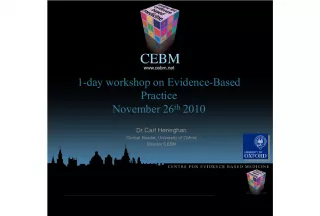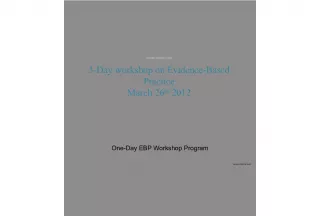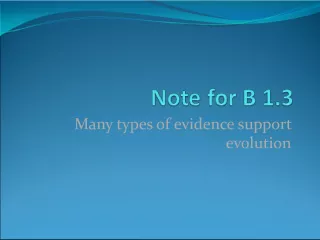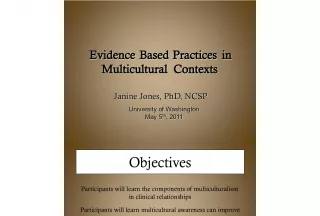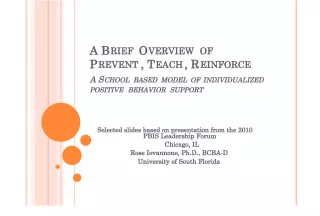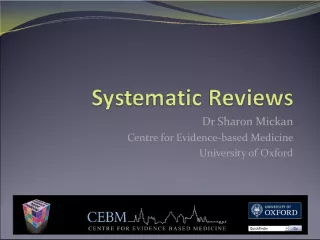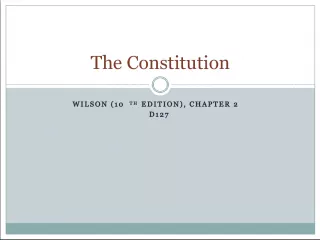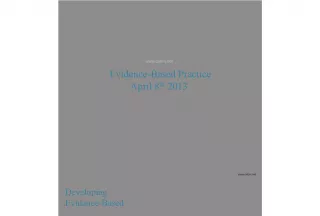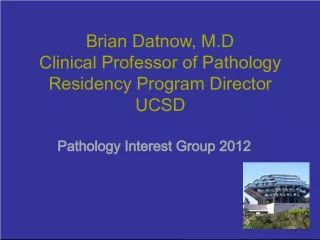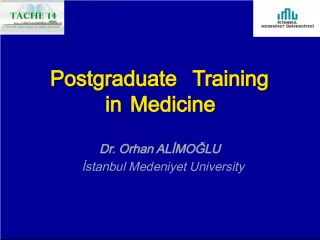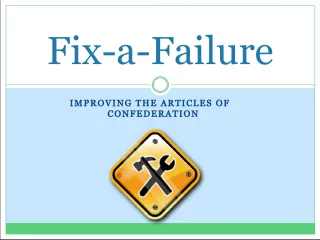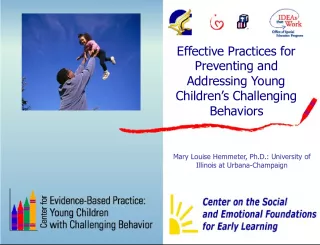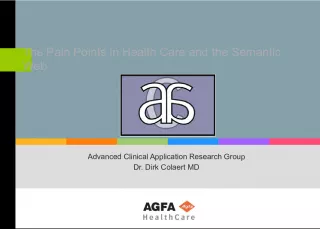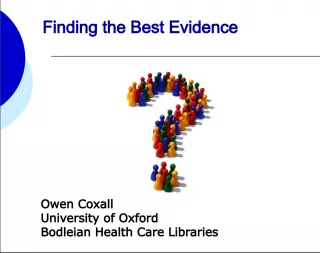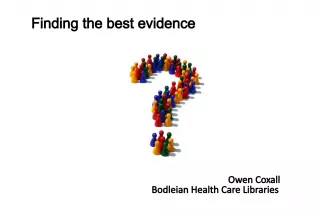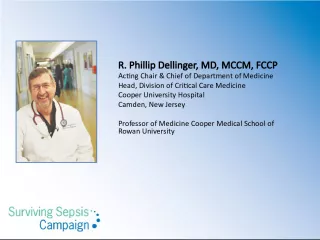Teaching Evidence-Based Medicine: Finding Articles Quickly
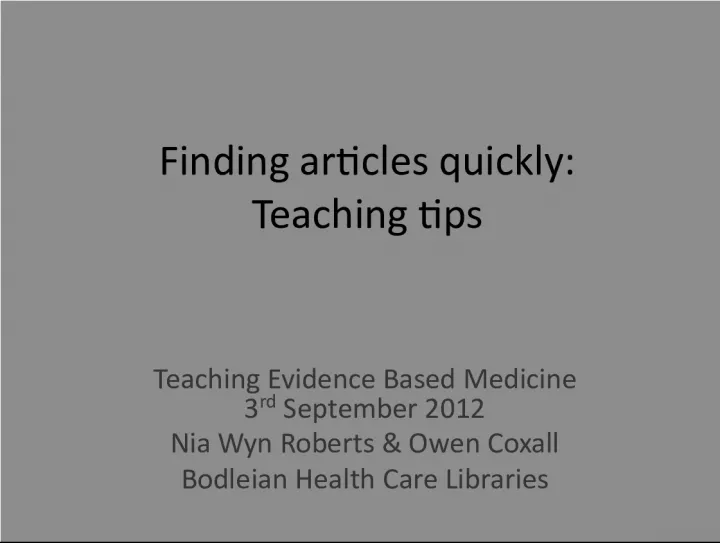

Nia Wyn Roberts & Owen Coxall Bodleian share valuable teaching tips for efficient article retrieval strategies, on 3rd September.
- Uploaded on | 1 Views
-
 emilie
emilie
About Teaching Evidence-Based Medicine: Finding Articles Quickly
PowerPoint presentation about 'Teaching Evidence-Based Medicine: Finding Articles Quickly'. This presentation describes the topic on Nia Wyn Roberts & Owen Coxall Bodleian share valuable teaching tips for efficient article retrieval strategies, on 3rd September.. The key topics included in this slideshow are . Download this presentation absolutely free.
Presentation Transcript
Slide1Finding articles quickly:Teaching tips Teaching Evidence Based Medicine 3 rd September 2012 Nia Wyn Roberts & Owen Coxall Bodleian Health Care Libraries
Slide2This is NOT asearching workshop
Slide3Finding information about Oxford
Slide5Why do this?• Starts off with a question everyone can answer? – Non-threatening, encourages people to participate • Learning point – Illustrates there are lots of different sources of information • Other examples – Going on holiday, buying a car, getting a new pet…
Slide6Finding clinical information
Slide8Why do this?• Gives you an idea of their current knowledge? • Gives an indication of the variety of resources available • Gives an opportunity to point out the pros / cons of different resources • If no one mentions Google – you need to work harder
Slide9Clinical scenario• Real clinical cases – From clinical rounds / consultations – Journal clubs – Online video clips • News stories – Newspapers, news web-sites – Blogs – Journal web-sites – In the news
Slide11PICOPatient / Population / Problem Intervention / Exposure Comparison Outcome Hypertension Blood pressure Cocoa Chocolate Flavanoid* N/A Reduce Reducing Reduction Lower Lowering
Slide12Why do this?• Get people to think of searching as related to patient care • Make searching relevant to day to day work • Less threatening than starting off asking people to think of their own questions
Slide13Search off
Slide151.UpToDate (Sub) http://www.uptodate.com 2. TRIP http://www.tripdatabase.com 3. PubMed Clinical Queries http://www.pubmed.gov 4. Cochrane Library http://www.thecochranelibrary.com 5. Google http://www.google.co.uk 6. GoogleScholar http://scholar.google.co.uk 7. Wikipedia http://en.wikipedia.org 8. NHS Evidence http://www.evidence.nhs.uk 9. Clinical Evidence (Sub) http://clinicalevidence.bmj.com/x/index.html 10. EBM Journal (Sub) http://ebm.bmj.com/
Slide16Why run a search off?• Get people out of the habit of using only 1 or 2 resources • Opportunity to discuss pros / cons of different resources • Introduce participants to point of care search tools e.g. research synopses & evidence syntheses
Slide17Teach yourself PubMed• Finding the Evidence videos http://www.cebm.net/index.aspx?o=1038 • PubMed tutorials – Full tutorial – Quick tours for individual tasks http://www.nlm.nih.gov/bsd/disted/pubmed.html
Slide18Why do this?• Allows you to teach a mixed group using a blended learning approach • Ideal for distance learning • Self-paced learning allows participants to focus on what they want to know • Introduce participants to resources they can use after the session to help them with searching
Slide19Useful sources: Clinical scenarios• News stories: – Medical News Today http://www.medicalnewstoday.com/ – Behind the headlines http://www.nhs.uk/News/Pages/NewsIndex.aspx – Blitter http://blitter.tripdatabase.com/ – National / local news web-sites • Video clips: – Embarrassing bodies http://www.channel4embarrassingillnesses.com/ – healthtalkonline http://www.healthtalkonline.org/ – Ehow health http://www.ehow.com/ehow-health/ – Youtube http://www.youtube.com/
Slide20Useful sources: searching• Cochrane Library www.cochrane.org • Global health library www.globalhealthlibrary.net • PubMed www.pubmed.gov • TRIP www.tripdatabase.com • HLWIKI Point of care decision making tools http://hlwiki.slais.ubc.ca/index.php/Point_of_car e_decision-making_tools_-_Overview
